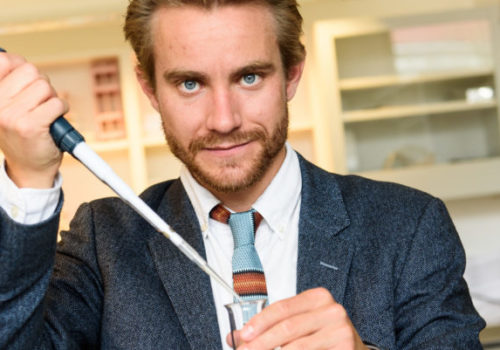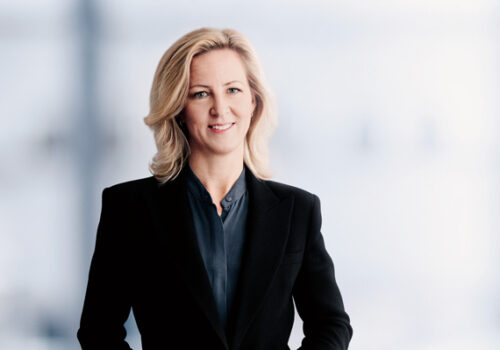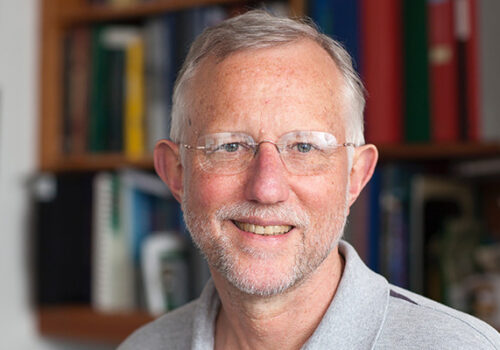Despite being the co-founder of Ilya Pharma and co-director at the Science for Life Laboratory (SciLifeLab), Dr. Mia Phillipson, considers herself a scientist foremost, not an entrepreneur.
“Most of all, I am a scientist. Yes, absolutely. This is my main occupation and the one in which I have the most expertise,” says Mia Phillipson, who is a professor in the department of Medical Cell Biology at Uppsala University.
The process of starting a company is not as interesting to her as trying to apply observations from her lab to the clinic problem, Phillipson says, and emphasizes the importance of having a very committed PhD student and access to business expertise when you start a company.
“It’s another way of thinking that I was not used to. It’s a different perspective with so many smart people guiding us to the fastest way to reach validation in patients,” she says. “Science is not everything – you can have the best therapy, but how do you build the product and will it be competitive?”
You must be extremely committed and sometimes stubborn. You have to have a selective bad memory and be extremely curious. Communication also has become much more important.”
However, many of the traits Phillipson cites as critical to good leaders apply to scientists as well. “You must be extremely committed and sometimes stubborn. You have to have a selective bad memory and be extremely curious. Communication also has become much more important,” she says.
“I always wanted to know how!”
Mia Phillipson’s scientific curiosity started when she was young, she says. “I’ve always wanted to know more and was always questioning, I always wanted to know how! What amazed me most was how the body works,” she says.
She first trained as a pharmacist at Uppsala University and then realized what she was missing was information about the drug targets, what was mediating the effects and side effects of the drugs. She went on to study medicine at the Panum Institute at the University of Copenhagen. She got her doctorate in physiology at Uppsala University, and then became interested in immune cells, which led to post-doctorate work in immunology, and she did her post-doctoral training in Calgary, Canada.
When I ask her to describe the life science vibe in Uppsala, she says it has a very high density of highly experienced people within life sciences, which makes it easy to come across the knowledge you need for validating the concept one step further.
There are a lot of spin-outs, incubator activities around, and having the Swedish Medical Product Agency across the street and in close proximity to the hospital is very stimulating.”
“There are a lot of spin-outs, incubator activities around, and having the Swedish Medical Product Agency across the street and in close proximity to the hospital is very stimulating,” she says. “This vibrant environment is promoting innovations and entrepreneurial activities, and was great for our spin-out journey with Ilya Pharma. The disadvantages of this community come later I guess, when the projects mature and the industrial development that is more capital-intense happens. Prior commercialization, access to capital and knowledge is scarcer locally.”
Her advice for the next generation of researchers is “Just do it! If you don’t put in the work, you can’t expect to get anything out of it. Find something that you believe is important and follow it through,” she advises.
Mia and her family live outside Uppsala and she likes to spend her Saturdays in the woods, taking a long walk with the family’s very active dog.
“We are very happy to live by the water just outside of Uppsala, and I try to be active and outdoors as much as possible whenever I am off work,” she states, and informs that on her nightstand lies “The sisters” by Jonas Hassen Khemiri, which she says is a great novel.
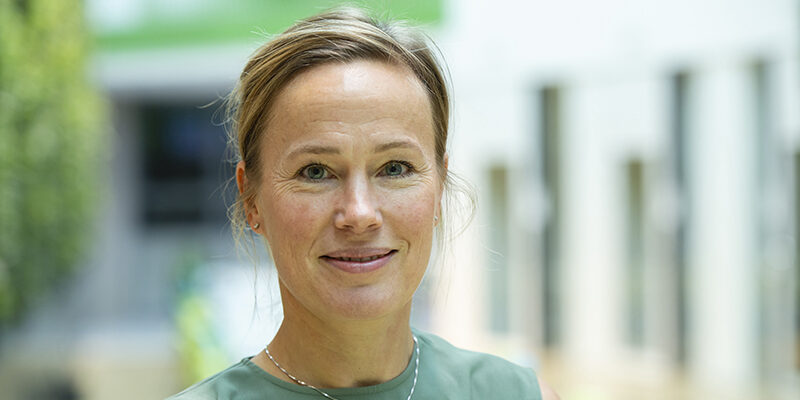
Mia Phillipson. Photo: Niklas Norberg-Wirtén/SciLifeLab
A science enabler
Mia Phillipson describes that she sees her role today also as a science enabler. “With time, I have learnt to appreciate the importance of the scientific environment for the success of my ambitious research projects, and I now try to be an enabler of the best science possible also in a larger perspective. The academic system relies on us working together and taking on collegial tasks, but it is important to be able to do this without sacrificing one’s own research,” she explains.
With time, I have learnt to appreciate the importance of the scientific environment for the success of my ambitious research projects, and I now try to be an enabler of the best science possible also in a larger perspective.”
Being a female scientist and a female leader she says that mostly she has been in very supportive environments and also made a wise choice in the father of her kids and in her partner.
“Sometimes ignorance is bliss, and I believe I have probably systematically underestimated structural hurdles or expectations associated with my gender,” she says. “General advice I give to others, as well as to myself, is to neither reduce nor overestimate your own contribution, to recognize the people that have contributed to every step towards success, and to be brave and speak up when you have important things to say. This is gender-neutral advice, and I guess the challenge is to know which part of this advice to follow.”
Mia also uses her membership in the Royal Swedish Academy of Science to communicate information about science to the public, a very important role for scientists today, she believes. “I think we scientists probably need to improve our communication, but I also believe that a great responsibility rests on the media to not succumb to click-bait and instead help us convey difficult messages. The truth is often that even though we know some things for certain, other parts of the picture are not as clear and are much more challenging to communicate.”
The Nobel Prize week gives us a unique possibility to focus and celebrate science, and to communicate this to the wider society in Sweden.”
The Royal Swedish Academy of Science also selects the winners of several of the Nobel Prizes, and although Mia is not partaking in this task, she has been giving several “Nobel lectures” at schools and preschools in Uppsala.
“They have been followed by a three-course lunch in the canteen, where the pupils get edible golden medals and the teachers are dressed up more than they are usually,” she describes. “It is a very festive way to focus on curiosity-driven basic science, and the importance of these for innovations that affect our entire community. The Nobel Prize week gives us a unique possibility to focus and celebrate science, and to communicate this to the wider society in Sweden.”
Ilya Pharma
In 2016, Mia co-founded Ilya Pharma together with her previous PhD student Evelina Vågesjö, who now serves as the CEO, and Stefan Roos, Associate Professor in Microbiology at the Swedish University of Agricultural Sciences. The clinical stage biopharmaceutical development company’s treatments target the function of tissue-resident immune cells and it is currently pursuing three clinical programs with fully owned assets from its proprietary ILP-technology platform. The company was formed based on discoveries that were part of Evelina’s PhD thesis and is inspired by the early work of Professor Ilya Mechnicov, who also received the Nobel Prize in 1908, describing specific functions of immune cells.
The clinical stage biopharmaceutical development company’s treatments target the function of tissue-resident immune cells and it is currently pursuing three clinical programs with fully owned assets from its proprietary ILP-technology platform.”
“We had the scientific findings of chemokines and immune cells in injured and ischemic tissue at Uppsala University with a gene therapy based approach. Then we developed the technology platform where lactic acid bacteria express the chemokines (ILP-drug candidates), industrialization, and when we tested them and they worked better than expected in animal models, we founded Ilya Pharma and transferred all data and intellectual property developed to the company,” describes Evelina Vågesjö.
Her former professor, co-founder and business partner, Mia Phillipson, has meant everything for the scientific parts of the company, Vågesjö adds. “I thought that she had a fantastic approach to science ten years ago and it is just getting better and better. She is very brave and continues to amaze me and others.”
Endless potential
Phillipson’s research combines immunology and physiology, including identifying the contributions of different immune cells important for tissue and organ physiology and how their behavior is regulated in different situations including inflammation, tissue restitution and development. The goal is to apply these findings to develop novel therapies to treat disease.
One of those unique approaches showing clinical promise recently is using genetically modified bacteria to speed wound healing, the first time bacteria has ever been tested for this purpose in a randomized controlled trial. Difficult-to-heal wounds are a growing medical problem and there are currently only two drugs approved with documented efficacy.
Together with her colleagues, Phillipson has now shown in a study conducted on humans that treatment with a special type of modified lactic acid bacteria works well and produces good effects on wound healing. Overall, 36 healthy volunteers were included in the study and a total of 240 induced wounds were studied.
The potential is actually endless when you consider how important a role proteins have in various processes in the body, and how many diseases we currently do not have good enough treatment for.”
“Our study shows that bacteria modified to produce and deliver human proteins for local effects can be used as drugs to accelerate wound healing. This is the first time this has been shown in controlled studies on humans, and it can be expected that the effect is greater in patients with diseases that negatively affect wound healing,” stated Mia Phillipson at the time of the announcement.
“The potential is actually endless when you consider how important a role proteins have in various processes in the body, and how many diseases we currently do not have good enough treatment for. We have already made another drug candidate to heal and reduce inflammation in the gut in cancer patients. It’s called ILP100-Oral and going forward we will start a research project with another chemokine for the treatment of lung diseases,” she says.
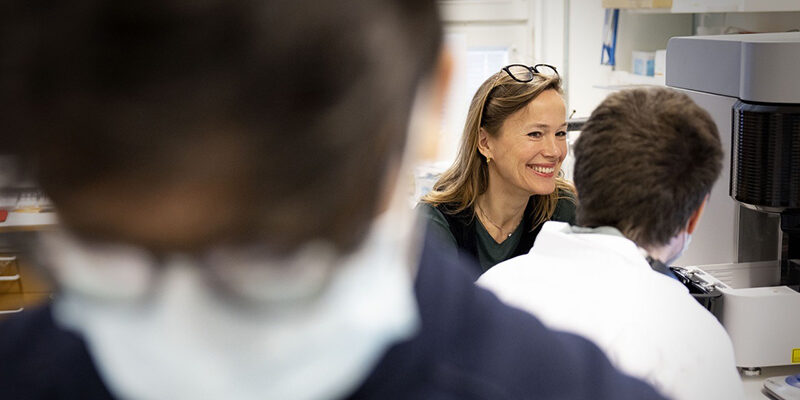
“You must be extremely committed and sometimes stubborn,” says Phillipson about being a scientist.
Next generation immunotherapy
The next step for much of the type of research in which Mia Phillipson is engaged is to start developing the next generation of immunotherapy.
“We have to take advantage of what immune cells have evolved to do,” she explains. “We have to discover novel mechanisms of action, and then develop means to influence these actions by cell therapies and biologics. “Basic research has an expanding tool box of cool technologies, “ she notes, “and that must be coupled with development to have a fast track to clinical trials and then researchers need to make wiser choices when it comes to drug candidate selections.”
It is marvelous to be part of the journey of Ilya Pharma, pioneering bugs as drugs with my champion-colleagues Evelina and Stefan.”
Mia’s passions include being in an environment where she can grow and learn new things and she has a driving force to create such an environment, “So people can achieve more than they could on their own. When they arise, it’s amazing,” she says.
Continuing to do the type of work she is doing, while having fun, and working with things she feels are important are how Phillipson views the future. “It is marvelous to be part of the journey of Ilya Pharma, pioneering bugs as drugs with my champion-colleagues Evelina and Stefan. And this is just the first of our attempts at developing basic scientific findings to the benefit of patients,” she concludes.
Featured photo of Mia Phillipson: Mikael Wallerstedt





